#punajuovan postaukset
Explore tagged Tumblr posts
Text
🇫🇮 A glimpse into my Finnish vocab system 🇫🇮
During my very successful attempt at avoiding thesis work over Christmas break, I managed to transfer all the Finnish vocab I’d recorded years ago from the first Harry Potter book over from Evernote to Notion. Turns out there were over 500 of them! Here’s a little before-and-after of my old and new systems, along with some observations I’ve made so far.
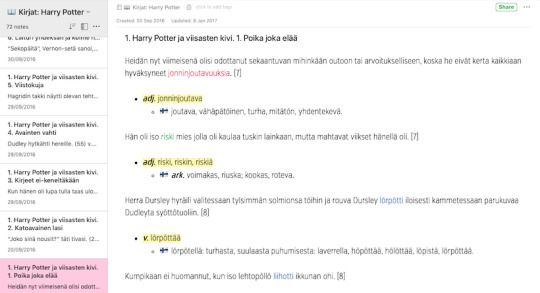
The previous system (Evernote):
Vocab entries are kept in separate notes within different notebooks
Each note contains entries from one chapter or an entire book
(+) Notes are stable and load quickly
(+) Entries can be viewed chapter by chapter
(+) Order of the entries follows progression of the text/stories
(-) Static and disconnected with limited organisational possibilities
(-) No way to quickly tally total entries by source, category, etc.
(-) Hard to keep track of entries, often leading to repeats
(-) No way to easily consolidate all problematic/unsolved entries
(-) Broken copy-and paste function meant a lot of typing by hand
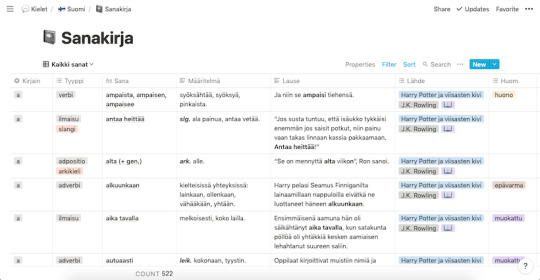
The current system (Notion):
There are no notes or notebooks, only one big table
Everything is organised and filterable by tags
(+) Dynamic and interconnected with flexible organisation
(+) Entries are filterable by alphabet, word class, source, etc.
(+) Automatic tallying of total entries by source, category, etc.
(+) Easy to quickly check entire database for duplicates
(+) Problematic/unsolved entries can easily be consolidated
(+) Copy-and-paste function doesn’t mess up formatting!!!
(-) Entries can no longer be viewed chapter by chapter
(-) Order of entries no longer follows progression of texts/stories
(-) Not sure how much the system can handle without lagging
My main concerns about my new system have to do with its sustainability: Notion is much younger (and therefore less established) than Evernote, I will have to pay to get past its storage limit after my school email address expires, and I’m not sure how many more rows I can add to the table before it starts to lag significantly. But overall I do think the new system’s improvements are significant enough for me to want to stick with it for now.
#langblr#finnish langblr#language learning diary type thing#language stuff#suomen kieli#productivity apps#evernote#notion#long post#photopost#punajuovan postaukset
11 notes
·
View notes
Photo
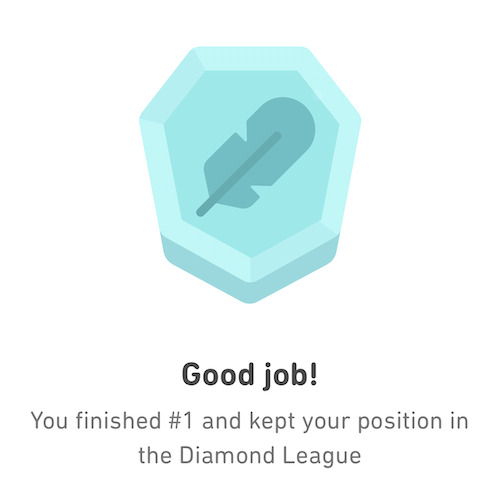

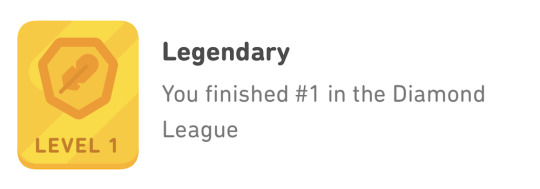
Yay! And now that I finally got that stupid badge out of the way, I can move on to other things...
#i wasted way too much time on this shit lol#language stuff#language learning diary type thing#language apps#duolingo#photopost#punajuovan postaukset
8 notes
·
View notes
Text
TIL that the Finnish adjective raukkamainen does NOT have the same meaning as the noun raukka (as one might logically assume).
n. raukka, raukan, raukkaa
🇫🇮 parka, rukka, raasu, raiska, riepu, polo(inen); säälittävä, surkea olento.
🇬🇧 poor thing.
adj. raukkamainen, raukkamaisen, raukkamaista
🇫🇮 pelkurimainen; halpamainen, selkärangaton.
🇬🇧 cowardly; mean, nasty.
While raukka *can* also mean ‘coward’, I think nowadays it’s mostly used in the ‘poor thing’ sense, and the most common word for ‘coward’ is pelkuri. So if you want to describe someone or something as pitiful, the adjective to use is säälittävä, not raukkamainen.
#language stuff#suomen kieli#language learning diary type thing#maybe i should start a series for this too#i might be fairly advanced in finnish#but i'm constantly learning new bits and pieces#and it's fun to keep a record of them#punajuovan postaukset
34 notes
·
View notes
Text
Making peace with my mother tongue.
Ever since my early teens I’ve had a... turbulent relationship with Mandarin Chinese, my mother tongue. This was brought on by a combination of factors such as the predominance of English in my daily life, ineffective and unengaging teaching methods in school, and the one-on-one lessons my Chinese teacher mum made me have with her that often culminated in screaming matches and a lot of crying. (I should mention that while bratty 14-year-old me was having none of it, I can now appreciate those lessons for the enormous privilege that they were. Too bad they were wasted on someone like me!)
After getting a terrible grade on my last Chinese final, I washed my hands of the language, ready to finally condemn it to disuse outside of absolute necessity. I moved from Asia to Europe, relished my newfound freedom to choose my target languages, and allowed the distance between my heritage and me to grow. At that time, and for many years after that, it felt glorious to never have to suffer through a compulsory Chinese lesson again.
Now, more than a decade, many identity struggles, and a good amount of therapy later, I feel like I'm finally reaching a point where most of my animosity and resentment towards my mother tongue can be contained and handled in a mature way. Now that I’m finally coming to terms with my inability to choose my origins and (very privileged) upbringing, I’m beginning to see how my rejection of my background and subsequent linguistic inadequacy has been hurting me, both mentally and professionally.
I am sick and tired of the shame and frustration that hits me whenever I attempt to read a Chinese text. I am sick of dreading every potential interaction with a Chinese-speaking person who isn’t family, of either pretending not to know Chinese or apologising for my halting, unsophisticated blabberings. Of feeling like a fraud when listing Chinese under the “language skills” section of my CV. And I am sick of the helplessness and disconnect I feel when I struggle to communicate on a deeper level with my own mother. She deserves better. I deserve better.
More clearly than ever, I can see the two choices that lie before me. I could take the shaky but undeniable foundation I’d so grudgingly built in my childhood and mould it into an asset with the potential for great benefit and enrichment. Or I could continue with my rejection as I have up till now, sticking with the languages I voluntarily chose to learn, whitewashing and dismissing my heritage, content with allowing a part of myself to always remain unresolved. There will be sweat and tears along either path, but the returns, I feel, will be very different. For the sake of my own happiness, I know which path I should take.
I don’t doubt that my relationship with Chinese will always be one of love and hate. But while there once was more hate than love, I hope this time it can be the other way round.
#for the record#this is my experience as someone who grew up bilingual#and later lost a good deal of her heritage language#i might feel differently if i'd never learnt chinese in the first place#or if i'd grown up in a different cultural environment#as it is#19 years of upbringing is hard to erase#language stuff#中文#personal stuff#punajuovan postaukset#long post
8 notes
·
View notes
Photo

It’s been years since I found this out but I still can’t get over the Estonian spelling of “google” (the verb). 😅
#it's a legit dictionary entry too#the da-infinitive is guugeldada#and the ma-infinitive is guugeldama#this is the second person plural imperative form#language stuff#eesti keel#punajuovan postaukset
19 notes
·
View notes
Text
Last week I learnt a new Chinese expression: 余音绕梁,三日不绝 (yú yīn rào liáng, sān rì bù jué), which refers to something along the lines of music lingering around for some time. An earworm, perhaps.
I learnt it from, of all places, a corpus of learner Finnish. 🤷🏻♀️
2 notes
·
View notes
Text
So, I really like names. Not enough to write an entire thesis on them, but enough to waste hours of my life reading forum threads about the “unique” names people like to give their kids. So when my partner sent me a link to the following article, I of course had to read:
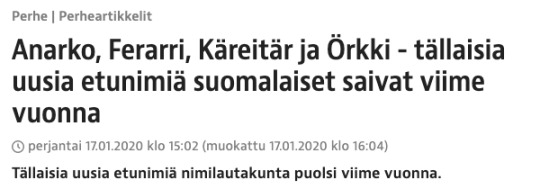
While scrolling through the list, one particular name caught my attention:

...I wonder if the parents were Tolkien fans.
#fun fact#i once spent quite a bit of time#looking up tolkien names on väestörekisterikeskuksen nimipalvelu#turns out there are quite a few#including but not limited to#gandalf morgoth and sauron#there's even celeborn#no teleporno tho#wonder why#language stuff#suomen kieli#photopost#punajuovan postaukset
3 notes
·
View notes
Text
🇪🇪 Language diary: “New” words // 3.9.2019
Some days ago I mentioned trying a new approach to reading in my target languages: instead of mechanically and obsessively referring to a dictionary throughout the text, I attempt to guess the meaning of new or semi-familiar words with the help of various available clues. I thought it might be interesting to keep a record of those words here, as well as the thought processes behind my guesses.
So here’s the first rendition of my version of vocabulary lists. As usual, nouns are listed in singular nominative, genitive, and partitive, and verbs are listed in da-infinitive, ma-infinitive, and first person singular present.
Gluteeni sisaldava jahu söömine ei avalda tervete inimeste seedelundkonnale mitte mingisugust mõju, näitab esimene topeltpime juhuslikustatud kliiniline katse.
(Source: Gluteenivaba dieedi kasulikkus seati taas kahtluse alla // ERR 30.8.2019)
n. topeltpime, topeltpimeda, topeltpimedat
Meaning: double-blind
Clue(s): From context, as this article is about the results from a scientific study, plus I knew that topelt means ‘double’ and pime means ‘dark’.
v. juhuslikustada, juhuslikustama, juhuslikustan
Meaning: to randomise
Clue(s): I vaguely remembered that juhtuma means ‘to happen’ and juhuslik means ‘random’, so it makes sense that this verb would have something to do with randomising.
n. katse, katse, katset
Meaning: study, experiment
Clue(s): The noun katse means ‘look’ or ‘glance’ in Finnish, but from the preceding word kliiniline (‘clinical’), it was clear that in Estonian and in this context katse refers more to a study or experiment.
Tulemuseks on mikrotoitainete puudus ning muu hulgas kõhnumine ja kasvupeetus.
(Source: Gluteenivaba dieedi kasulikkus seati taas kahtluse alla // ERR 30.8.2019)
n. mikrotoitaine, mikrotoitaine, mikrotoitainet
Meaning: micronutrient
Clue(s): From context, plus mikro is obviously ‘micro’ and I knew that toit means ‘food’ and aine means ‘substance’.
v. kõhnuda, kõhnuma, kõhnun
Meaning: to become thinner
Clue(s): I actually remember the word kõhn (‘thin’) from the first Harry Potter book: more specifically, from the line Proua Dursley oli kõhn ja blond. I also knew that the -u- in the verb usually refers to a process happening to the subject (don’t really know how to explain this properly).
9 notes
·
View notes
Text
📚 My multilingual reading list 📚

For the past couple of years I’ve been tracking my reading in various paper bullet journals but they never really worked out because 1) my terrible attention span meant I rarely reached for paper books, leaving me with little to record and 2) I could never be bothered to update things on time.
Recently I gave both audiobooks and digital reading lists a try and so far things have been working out pretty well:
🎧 In December I managed to listen to some 15 books, more than twice the number I’d read in the previous 11 months.
🗒 I find this digital list much more versatile and pleasant to use, and the threshold to update it lower.
Here’s how I have things set up:
Status: My categories are TBR (to be read), Reading, Finished, and DNF (did not finish).
Type: I have 💬 for audiobook and 📖 for paperback.
Language: I currently have books in 🇬🇧 English, 🇫🇮 Finnish, and 🇪🇪Estonian -- hoping to add more languages in future!
Name: The title of the book in the language I read it in.
Author: In addition to the original author(s) (in grey), I also like to include the translator(s) (in yellow) and audiobook narrator(s) (in orange) if applicable.
Start date: A lot of the older entries are blank because like I said, I’m terrible at updating things 😅
End date: I have my entire reading list automatically sorted by end date in ascending order.
I really like this system so far because as a visual person I find the emoji and different colours both engaging and aesthetically pleasing. It’s also really easy to keep things organised with tags, automatically count the books in each category, and show filtered entries within a certain time frame. Here’s another picture to further illustrate things:

I use Notion (referral link / non-referral link) to maintain this reading list. The premium version with unlimited storage is currently free if you sign up with a school email address. The referral link will give new users $10 credit and also grant me $5 credit. Your name and email will show up under the “Earn Credit” tab of the person who referred you so please take that into account!
#langblr#language stuff#books#reading list#productivity apps#notion#i know i go on and on about notion#but i've truly been enjoying it#photopost#long post#punajuovan postaukset
2 notes
·
View notes
Text
Heh, TIL that the Finnish word for scurvy is keripukki. Apparently it’s derived from the Latin scorbutus via Swedish (skörbjugg > skerpuuki > keripukki). Quite a cute-sounding name for a nasty disease, as is the Estonian equivalent, skorbuut.
8 notes
·
View notes
Text
🇫🇮 Language diary: TIL in Finnish // 12.9.2019
TIL that a sunny side up egg is called häränsilmä in Finnish. 🍳
Without context, I would’ve immediately associated häränsilmä with ‘bullseye’ (which, incidentally, is another one of its meanings). After all, that’s its literal translation: härkä is ‘bull’ and silmä is ‘eye’. Never would I have thought that it might have anything to do with eggs!
And, in the process of looking up the word for confirmation, I further learned that häränsilmä actually has quite a few different meanings. According to Kielitoimiston sanakirja, it can mean the following:
a swirl or eddy in the water 🌊
a sunny side up egg 🍳
a type of butterfly (this one, specifically) 🦋
a type (or genus) of plant (this one, specifically) 🌼
a bullseye (the centre of a shooting target) 🎯
In addition to those definitions above, the Finnish wikipedia page has a couple more. Also I never knew that bullseye can mean SO many different things in English! The only meaning I was aware of up to this point was the shooting target one... 😳
(Bonus TIL: that dictionary entry also taught me that there’s another word for ‘yolk’ besides keltuainen: ruskuainen. I’ve never heard anyone use that word in daily life, though.)
7 notes
·
View notes
Photo
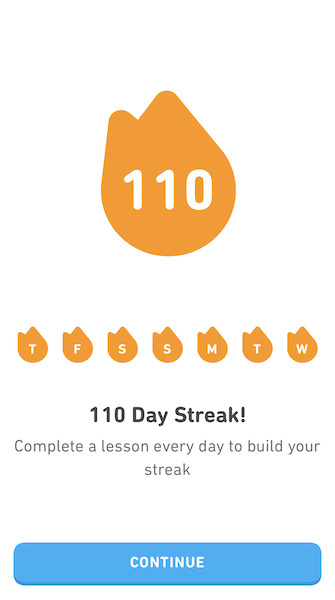

Super old screenshot but duolingo changed up their streak animation?! Tbh I liked the old one more... They also removed the 50 gem reward after completing each skill level AND the random treasure chests after the first lesson of the day! Not that gems were ever good for much but MEH
#like come on man you hassle me at 22:37 every day#at least give me some incentive to complete that lesson#language stuff#language apps#duolingo#language learning diary type thing#punajuovan postaukset
2 notes
·
View notes
Text
I’ve had my eye on a subscription at The Chairman’s Bao for quite a few weeks and I’m so glad I held out until now because they’re currently having a 30% off sale and I managed to snag a subscription for much cheaper than usual. No longer do I have to content myself with just the free articles, yay!
Starting off with HSK 3 articles, I’ve been pleasantly surprised to find them easier than expected. I guess I still have a fair amount of passive vocab lurking in my memory? For now, I will resist the temptation to go up a level or two, and instead focus on learning to read more fluently, without having to pause here and there to dredge up the pronunciation of some half-forgotten word.
Writing down sentences with unfamiliar words has been quite therapeutic!

#langblr#language stuff#中文#language learning diary type thing#that pic right there#is why i'm not one of those aesthetic -blrs#photopost#punajuovan postaukset
1 note
·
View note
Photo
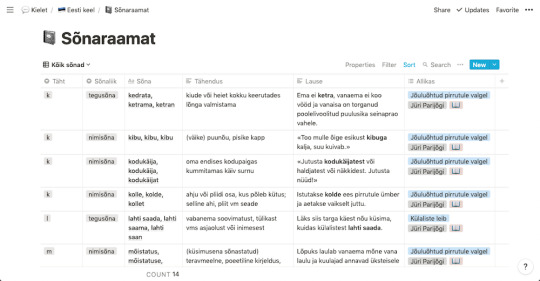
What better way to spend a sleepless night than by whipping up a new vocab management system for your target languages?
I’ve been playing around with Notion (referral link; see details below) for the past few days and I honestly like it SO much more than the static and disconnected system I’ve had up till now in Evernote. With Notion I can easily organise and filter entries around within a single table, and it’s just so much more... dynamic and functional?? Plus I really like the idea of having everything in one neat database instead of 128587235 separate notes.
I currently have my personal dictionary (sõnaraamat) set up for Estonian but I’m definitely going to do this for my other target languages too! Everything is automatically arranged in alphabetical order and the columns I have right now are:
Letter of the alphabet (täht)
Word class (sõnaliik)
The vocab entry itself, usually a single word (sõna)
The meaning or definition of the entry (tähendus)
A sentence the entry appears in for context (lause)
The source of that sentence (allikas)
I have the name of the source highlighted in blue.
I have the creator of the source highlighted in grey.
I plan to organise sources by categories (books, articles, etc).
This is just the beginning of my potential new system, a product of my insomnia brain that I will hopefully continue to work on. I’m excited to see what else I can do with these new tools!
For the record, the premium version of Notion is currently free if you have a school email address (the free-for-everyone version has a storage limit that’s still pretty generous). The referral link above will give new users $10 credit to squirrel away for future use (and in the interest of full disclosure, I get $5 credit too).
#langblr#language stuff#eesti keel#productivity apps#notion#aaaaand amidst the throes of my continued insomnia#i've also come up with a bomb workout tracker#an even fancier table for all my goals#an exhaustive schedule of upcoming uni stuff#a v. extra and pretentious multilingual reading list#AND a budget where i don't have to manually calculate everything#WHY is it always all or nothing with me?!#it's either months-long depressive slumps#or bouts of manic 5am productivity#but whatever#i'm loving this app so far#punajuovan postaukset
1 note
·
View note
Text
Recent target language books #1 🇬🇧🇪🇪🇫🇮
As part of the A Book in Target Language Challenge, here’s a list of books I’ve recently finished. Each book will have its language (for consistency, 🇬🇧 will be used for all English-language books) and format (📖 for paperback or ebook, 💬 for audiobook) indicated beside it.
Books I’ve finished so far:
🇬🇧💬 Becoming by Michelle Obama
A very enjoyable (in terms of both language and content) and easy listen, I don’t have much else to say 🤷🏻♀️ I might reread this in Finnish at some point.
🇪🇪📖 Talvine metsasõit by Lydia Koidula
This is a very short story that I found to be way beyond my current level (intermediate). There was a lot of poetic language and nature vocabulary in addition to long and complicated sentences -- I understood enough to get the gist of the story, but nowhere near enough to truly enjoy it. You can find the full text online at Digar (click on “vaata” to view and “salvesta” after that to download).
🇫🇮💬 Orjattaresi by Margaret Atwood
This is the Finnish translation of The Handmaid’s Tale (side note, I really like the sound of the Finnish title). I last read this book over a decade ago so it was fun to revisit it in a different language and at a different stage of my life. I found the audiobook easy to follow at my current level (advanced); the dialogues were in standard language with no slang or colloquialisms.
🇬🇧💬 The Testaments by Margaret Atwood
Despite the disturbing content, this was an enjoyable listen. It’s been so long since I’ve been engrossed in a story, feeling compelled to continue at the expense of my other responsibilities... I also think that the audiobook, with its multiple narrators, really helped make the story come alive for me.
🇫🇮💬 Ehkä tänä kesänä kaikki muuttuu by Sisko Savonlahti
You might not like this book if you don’t care for slice-of-life stories or hot mess millennials. Personally, I quite enjoyed it, partly because I like the genre, and partly because I, as a fellow hot mess millennial, identify with the narrator to a painful extent (though she did eventually get on my nerves). A quick, easy, and entertaining listen with simple, straightforward sentences and no challenging vocabulary -- a B1/2-level learner might be able to follow along with no major problems.
🇬🇧💬 The Colour of Magic by Terry Pratchett
I’ve been meaning to read this book forever and finally got round to it! A fun and somewhat absurd (not in a bad way) listen that was humorous but didn’t quite make me laugh out loud. Still, I liked it enough to want to continue the series. I think the audiobook was really well done and would definitely recommend it to both native and ESL speakers.
1 note
·
View note
Text
🇪🇪 Language diary: “New” words // 4.9.2019
This personal vocabulary list contains recently encountered new or semi-familiar words outside of my active vocabulary. These are words I might not necessarily be able to come up with on my own, but whose meanings I can deduce from various available clues without the help of a dictionary. I thought it might be interesting to keep a record of them here.
Nouns are listed in singular nominative, genitive, and partitive, and verbs are listed in da-infinitive, ma-infinitive, and first person singular present.
Jaapanit külastavate turistide hulk on viimastel aastatel plahvatuslikult kasvanud -- enamus külastajatest saabuvad naaberriikidest Hiinast, Lõuna-Koreast, Filipiinidelt ja Malaisiast.
(Source: Jaapan tahab rohkem turistide raha, aga mitte turiste // Postimees 27.8.2019)
adv. plahvatuslikult
Meaning: explosively
Clue(s): I learned somewhere (I wish I remembered where!) that plahvatus means ‘explosion’, so it makes sense that the adjective would be plahvatuslik (‘explosive’) and the adverb plahvatuslikult.
Vägagi enda viisides kinni jaapanlased ei soovi näha turistide horde, kes põhjustavad liiklusummikuid nii auto- kui ka kõnniteedel, lärmavad, viskavad prügi maha ja tungivad eravaldustele.
(Source: Jaapan tahab rohkem turistide raha, aga mitte turiste // Postimees 27.8.2019)
n. hord, hordi, hordi
Meaning: horde
Clue(s): I understood this because of the English word horde -- didn’t know it existed in Estonian too!
n. liiklusummik, liiklusummiku, liiklusummikut
Meaning: traffic jam
Clue(s): I remember this word from the very beginning of the first Harry Potter book (which is pretty much as far as I’ve gotten, heh) where Mr. Dursley was sitting in the traffic jam on his way to work: Kui ta istus tavalises hommikuses liiklusummikus...
v. lärmata, lärmama, lärman
Meaning: to make noise
Clue(s): I first learned of this word from the Estonian translation of Tove Jansson’s Comet in Moominland, in the scene where the Hemulen rescues Moomintroll & co. from their boat after noticing the noise they were making. There were loads of new words in that book but this one stuck to my memory because I later recognised it from the Põhja-Tallinn song Ei salli vaikust (Me ei salli vaikust, pidutseme, lärmame, elame end välja me...)
Jaapani alati kapriisne loodus tõi suvel saareriigile kaela lausa mitu katastroofi: juunis tabas Osakat võimas maavärin ja juulis kimbutasid Lõuna-Jaapanit väga tugevad vihmad, mis põhjustasid laialdasi üleujutusi.
(Source: Jaapanlastel oli katastroofiaasta // Postimees 22.12.2018)
adj. kapriisne, kapriisse, kapriisset
Meaning: capricious
Clue(s): The English word capricious.
n. üleujutus, üleujutuse, üleujutust
Meaning: flood
Clue(s): Also learned from the Estonian translation of Comet in Moominland, plus I knew that üle means ‘over’ and ujuma means ‘to swim’.
2 notes
·
View notes